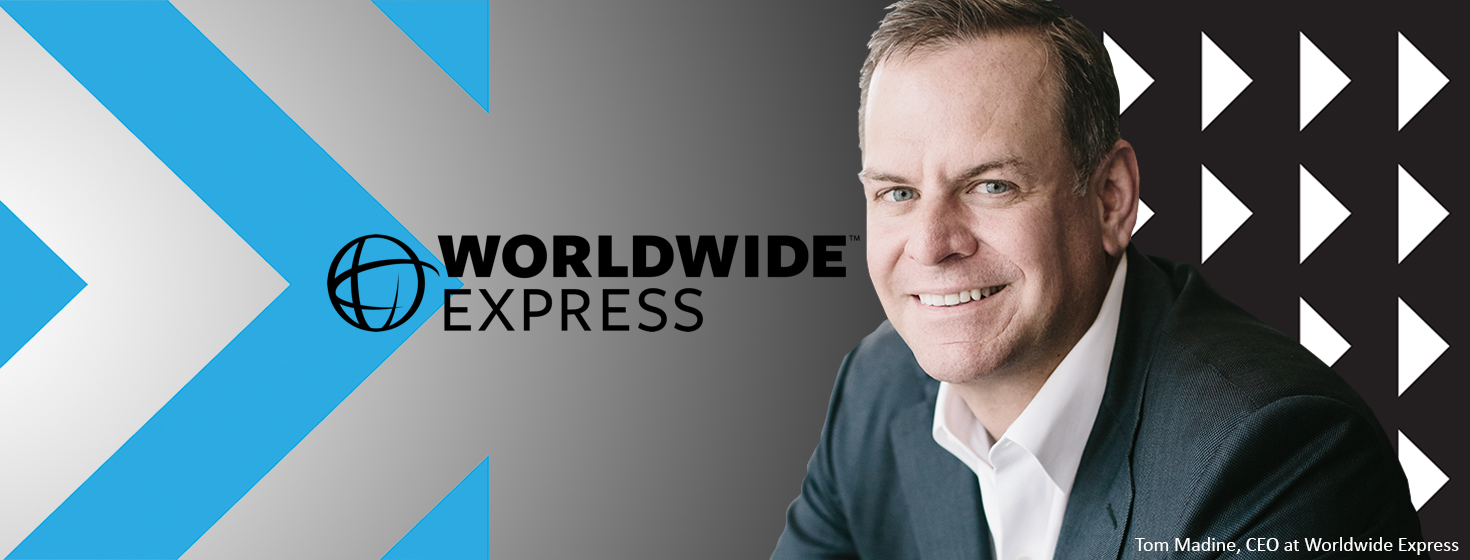How Worldwide Express Navigates the Changing Supply Chain & Logistics Arena

Tom Madine, CEO of Worldwide Express, a leading small package, truckload, and less-than-truckload shipping solutions company, discusses how his company is coping with the significant changes and challenges in the supply chain and logistics industry.
SMC³ Q&A with CEO Tom Madine
This year at Worldwide Express, Tom Madine, the company’s CEO (pictured above), has been seeing logistics industry insiders operate from a position of strength and profitability.
While the supply chain is humming along, there are also some signs of concerns.
Madine recently spoke with SMC³ about how he sees the current logistics arena in advance of the Connections 2019 supply chain conference, where he will speak during the “Building the Next Generation 3PL” thought leader panel on the opening day of the educational logistics event.
From a carrier perspective, what are some of the major trends you’re currently seeing in the LTL marketplace?
Following a very robust and profitable 2018, most of our carrier partners have been making very strategic investments in their businesses. Many are using the tailwinds from last year to make sure their businesses aren’t just getting bigger, but stronger in the years ahead by making smart decisions about their fleets, terminal footprint and the technology stack they use to enable their businesses.
Their investment in technology really seems to have ramped up, particularly in areas to help remove the friction-causing activities in the shipment lifecycle. Half a decade ago, most carriers were midstream in the process of implementing tools to better capture characteristics of freight. Now they’re finding ways to use that data to make better yield-management decisions and are using it in concert with visibility solutions to help their internal teams and shippers/3PLs know what’s happening with their shipments at any given time. These tools are really giving carriers the opportunity to be much more strategic in how they’re running their networks and, in turn, be more selective about the business that they choose to haul.
What supply chain themes have defined the first half of the year?
Settling into the “new normal” after a banner 2018 has been an interesting transition for many companies. There was a lot of noise in the first quarter with weather, trade uncertainty and fallout in truckload pricing; overall, the first half of the year was still very positive for Worldwide Express and many of our carrier partners. It was certainly a much softer freight environment than last year, particularly in truckload, and that seems to have given shippers a chance to catch their breath and consider their supply chain strategies for the year ahead. Despite a bit of a slowdown, we’ve still found a lot of opportunities to create value for new customers within our core business segments.
We’re looking forward to a strong remainder of 2019. Our crystal ball is probably as bad as everyone else’s in forecasting GDP, but we’re cautiously optimistic about what’s ahead. Shippers are going to continue to look for ways to reach their customers more quickly and reliably, which should be a boon for final-mile companies and providers of multimodal capacity solutions across TL, LTL, and parcel. We also expect to see more consolidation in the non-asset 3PL space, as companies like Worldwide Express expand their reach and find new, innovative ways to meet the needs of shippers they have today and those they’ll bring on tomorrow.
What new regulations will have the most impact on the domestic transportation market?
It seems as if the impacts of the ELD mandate have been largely worked through, but ELDs certainly had a significant role in the tightening of capacity that we experienced in 2018. We don’t expect it to necessarily be as disruptive on that scale but do foresee the implementation of the National Drug and Alcohol Driver Database, currently slated for January 2020, being pretty impactful to the transportation market. There are obviously a lot of safety benefits in having this information available about the potential bad actors out there, but it will definitely have an impact on the available driver pool and transportation rates, as a result.
What are the main needs of your customers in the current transportation arena, and what are you doing to address those requests?
Customers want ease and simplicity. They want to work with capable partners who can act as an extension of their business, who will take the time to sit with them to understand their needs and be able to offer them technology-enabled solutions that solve real problems in their supply chains. They may have complex challenges, but they’re looking for simple solutions.
Sometimes the solution is just “give me a website where I can quote and book and a number to call if something goes wrong” and that’s fine – we have those customers, and we create value by offering those products to them. But we’re increasingly finding others who want someone to walk the dock with them, go through their shipping procedures, and to support them in finding innovative ways to improve their supply chains. That’s not a new concept, but even as more parts of the world become digitized, we find customers wanting more from us to help manage their entire supply chains.
We don’t believe in developing technology for the sake of technology, but in building practical tools to enable our customers’ businesses and to remove the friction of shipping for both them and us. We don’t want to remove the human element from shipping. In fact, we believe in the opposite. Our people take a lot of pride in working with customers of all sizes to understand their needs and craft solutions to help their businesses operate more smoothly whether they’re shipping packages, pallets or full truckloads. Don’t get me wrong, we invest a ton in tech, but we believe it should be more of an enabler for the business, and that our people should be at the forefront for how our more than 90,000 customers think of us.
Are there any emerging technologies that will be game changers for the supply chain industry?
With the number of customers, sales and support people we have spread across the country, our biggest challenge is to be able to understand what’s going on in real time, interface with our carrier partners efficiently and get a solution in place as quickly as possible. To that end, having a highly integrated and API-enabled infrastructure is absolutely critical for our business. We can’t afford to wait on information, whether that’s from a customer or from a carrier, so we’re investing a ton in technology that brings that information to the forefront and is paired with the right tools and data analytics so our teams can take immediate action on it.
It seems like we’re finally getting to a point where people are understanding that there’s not a silver bullet with technology. Blockchain probably isn’t going to upend the transportation industry. AI doesn’t solve all the world’s problems. APIs aren’t worth anything if you don’t do something of value with the data you consume.
We continue to believe that technology is a tool that enables the business and its customers. The real “game changer” will be how talented people use those tools to make smarter decisions and create incredible customer experiences.
To hear more from Tom Madine and other industry experts, sign up today for the three-day supply chain conference Connections 2019 to learn about emerging trends, current challenges and new innovations in the supply chain.
Read the Article: C.H. Robinson’s CEO Bob Biesterfeld Discusses Technology and the State of the Logistics Industry
Related LTL Resources
Bid$ense: Streamlined Transportation Sourcing New!
This paper details how using Bid$ense leverages SMC³’s lifetime of transportation purchasing knowledge, allowing customers to incorporate pricing, claims ratios, on-time performance and transit times into their LTL bidding analysis. Download Now!
Why eShipping Selected the SMC³ Platform for Transactional LTL API Connectivity
In this case study, Chad Earwood, CEO of eShipping, describes how they integrated the SMC³ platform for transactional LTL API connectivity, and by using the analytical APIs RateWare XL and CarrierConnect XL they are able to obtain immediate LTL rates and audit LTL pricing. Download Now!
Strategic LTL Bidding for Minimum Cost & Maximum Efficiency
This paper details how SMC³ designed Bid$ense for complete procurement transparency, and how you’ll move ahead with ease and confidence toward best-choice carrier qualification and truly strategic LTL procurement. Download Now!
The Case for a Re-Indexed LTL Benchmark Pricing System
This paper takes a deep dive into SMC³’s CzarLite XL, an advanced pricing system solution that gives shippers, logistics service providers and carriers a new neutral benchmark choice when negotiating LTL shipping rates. Download Now!
The Single Source for LTL Pricing & Transit Information
The SMC³ Platform empowers 3PLs and Shippers of any size to successfully navigate and optimize the LTL shipment arena, choose the level of computing power based on your specific needs and operating environment with a technology platform offering the best of all worlds. Download Now!
More Resources from SMC³
Article Topics
SMC3 News & Resources
SMC3 Mercury Gate Case Study - Improving Workflows and Enhancing Efficiency with LTL APIs SMC3: Is Technology a Competitive Advantage in the Modern Supply Chain Industry? Armada’s Prather examines the disconnect between the freight economy and the macro economy at SMC3 JumpStart 2024 SMC³’s Solution to the Logistics Industries Talent Problem 2024 Transportation Rate Outlook: More of the same? Refining LTL API Consumption for Optimal Efficiency and Enhanced Services Regulations Impacting Less-than-Truckload More SMC3Latest in Transportation
FedEx Announces Plans to Shut Down Four Facilities The Two Most Important Factors in Last-Mile Delivery Most Companies Unprepared For Supply Chain Emergency Baltimore Bridge Collapse: Impact on Freight Navigating Amazon Logistics’ Growth Shakes Up Shipping Industry in 2023 Nissan Channels Tesla With Its Latest Manufacturing Process Why are Diesel Prices Climbing Back Over $4 a Gallon? More Transportation













